When Humam Abu Srour, 46, a furniture store owner in the city of Bethlehem, looked around at the massive crowds of people surrounding him on Tuesday, he was in awe.
“I saw my neighbors, friends, family, other business owners and shop keepers, and people of all different class backgrounds — people who you don’t typically see at these kinds of protests,” Abu Srour said. “It was an amazing sight.”
Abu Srour was among thousands of Palestinians who closed down their shops and gathered on Tuesday near the main intersection of the southern occupied West Bank city for a nationwide general strike that was taking place across all of Palestine, dubbed by Palestinians in Arabic as the “Strike for Dignity.”

The crowds in Bethlehem were among millions of Palestinians across the West Bank, Gaza, Jerusalem, Israel, and surrounding regions who participated in the historic strike, which called for an end to Israel’s “campaign of violence and ethnic cleansing against our people.”
The strike, which was called for and organized by Palestinian youth, grassroots organizers, popular committees, and civil society organizations across Palestine was launched in response to Israel’s onslaught on Gaza, which has killed 213 Palestinians so far, Israel’s continued aggression in Jerusalem and Sheikh Jarrah, and the attacks being faced by Palestinian communities inside Israel.

The strike, which is being joined by a day of action and solidarity in cities across the world, is thought to be the first general strike of this scale to take place across all of historic Palestine since 1936.
“This strike is a part of our resistance against the Israeli occupation, and is our way to stand up to what they are doing to our people all across Palestine, in ‘48, Gaza, Jerusalem, and here in the West Bank. This is the bare minimum of what we can do to help our people. It is our national duty.”
Humam Abu Srour
“This strike is a part of our resistance against the Israeli occupation, and is our way to stand up to what they are doing to our people all across Palestine, in ‘48, Gaza, Jerusalem, and here in the West Bank,” Abu Srour said. “This is the bare minimum of what we can do to help our people. It is our national duty.”
Abu Srour, who’s lived through two major uprisings in Palestine, said that Tuesday’s strike was different to what he has seen with past general strikes. “This time is different, because everyone is involved, and this is a popular movement,” he said.
“We of course have mixed feelings, it’s bitter-sweet, what we witnessed today,” he said. “We are still devastated about the killing of our people in Gaza, but we are happy about what happened with the strike, and that everyone came together.”
“We saw people of different backgrounds, different cities, different places from the south to the north gather together to demonstrate against the occupation, in spite of the way that Israel has tried to separate and divide us,” he said.
“Today we sent a clear message: that we are united as a Palestinian people.”
Community, history, and heritage
Earlier in the afternoon before the crowds of people marched through the city of Bethlehem, Palestinians in the Aida refugee camp, one of the city’s three refugee camps, gathered underneath the structure of a massive key at the camp’s entrance for a community sit-in.
Nidal al-Azzeh, a leader in the community and director of the Bethlehem-based NGO BADIL — Resource Center for Palestinian Residency and Refugee Rights, sat on the steps of the Aida Youth Center, surrounded by children, young people, and other community elders.

Al-Azzeh started off by posing a question to the children: “who can tell me what the Nakba is?” he asked.
One boy timidly raised his hand, and said “it’s when our grandfathers were kicked out of our homes.”
Al-Azzeh nodded, and followed up with another question: “and where are you all from?” To which the children began listing off a number of villages (Deir Aban, Beit Nattif, Beit Jibreen) — all villages depopulated by Israel in 1948.
For almost an hour leading up to the larger afternoon protest, al-Azzeh and other local community organizers discussed with the children everything from the ongoing Nakba, the expulsion of families in Sheikh Jarrah, the wall and settlements, and all the ways in which the Israeli occupation affects their lives.
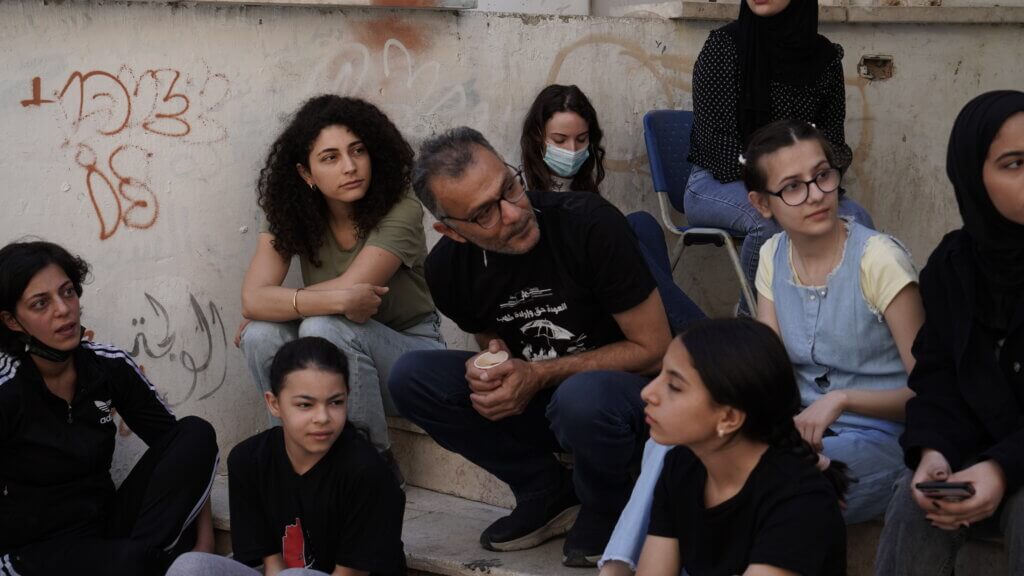
The scenes underneath the larger than life “Key of Return” in the Aida Camp, were ones that played all across Palestine on Tuesday afternoon, as people organized community sit-ins and activities for youth, centered around Palestinian history and heritage.
The strike on Tuesday was not just about shutting down shops, offices, and schools, or about the boycott of Israeli goods and services. It was about community action, education of youth about their history, and proudly sending the message that “we are Palestinians, and we are united.”
In the call to action being circulated on Palestinian social media, Palestinians called on each other to host community sit ins and activities, raise Palestinian flags from their homes, play Palestinian music in the streets, and decorate the walls and streets of their communities with symbols of Palestine, and messages in support of Gaza and Sheikh Jarrah.
Inside the Aida Youth Center, a group of teenagers from the camp used face paint to paint Palestinian flags and kuffiyeh patterns on the faces and arms of the children from the camp, who proudly wore their new designs while holding up Palestinian flags.

Joining the community sit-in in Aida camp was Aiah Odeh, a 28-year-old human rights lawyer who came all the way from Nazareth for the event. During the sit-in, many of the children asked her questions about life in Nazareth, and what it’s like to be a Palestinian living in Israel — as many of the children had never left the boundaries of the West Bank.
“I came here to show my support to the refugee camps and people of Bethlehem to show them that, even all the way in Nazareth, we are with them, and we are one people,” she said.
“It’s important for me to show the young people here that there are people also striking with them in Nazareth, and that after 73 years of occupation and racism and discrimination against us, we are still standing together as Palestinian people.”
“We are one people, and we are going to stay one people forever,” she said.
Economic resistance
General strikes in Palestine are not a new form of resistance to Israeli oppression. They’ve been used over the decades to put economic pressure on Israel — as a huge portion of the labor force in Israel relies on Palestinian citizens of Israel, Palestinians in Jerusalem, and day laborers from the West Bank — and have always drawn widespread support from Palestinians living across the region.
In recent years, however, while still used frequently as a tool of resistance, strikes have become more localized within separate geographic locations (i.e Gaza, the West Bank, etc).
What’s being marked as historic about Tuesday’s strike, is the collective participation of Palestinians across all of historic Palestine, particularly the participation of Palestinian citizens of Israel.
Odeh, who works for an Israeli human rights organization, says she was ecstatic to see the level of participation among Palestinian citizens of Israel like herself, which she and others say has played a big role in the success of Tuesday’s strike.

“They keep calling us Israeli Arabs — we are not Israeli Arabs, we are Palestinians. And today, they have been reminded of that.”
Aiah Odeh
“I didn’t go to work today to show my colleagues that I am Palestinian, and I am part of something bigger than me, and we are really making something happen,” she said, adding that the the strike “isn’t just symbolic, its having a real effect on the ground.”
“Israel is dependent on the 20% of people living inside [Israel], who are Palestinians. The Israeli economy depends on us. And Israel needs to know that it’s not just standing on its own, it depends on us,” she said.
Odeh highlighted the fact that Palestinian citizens of Israel make up a significant part of Israel’s workforce, including doctors, lawyers, nurses, and more.
“More than 20% of the medical sector in Israel are Palestinians,” she said. “For example, my mom is a nurse, and she didn’t go to work today. By going on strike, she is sending the message that we aren’t just a group of civilians, available for them to attack us.”
“We can affect their economy, and can stand up for ourselves in a way that’s having a difference on the ground,” Odeh said.
In addition to the economic effect that Palestinians striking inside Israel is having, Odeh said the general strike is sending an even stronger message: “We are raising their consciousness and awareness of us as Palestinians.”
“They keep calling us Israeli Arabs — we are not Israeli Arabs, we are Palestinians. And today, they have been reminded of that.”
Unity & hope for the future
In the streets and on social media, the resounding message coming from all corners of Palestine on Tuesday and in the days and protests leading up to the strike, is that Palestinians are united.
On social media and on the ground, Palestinians are calling the current uprisings the “Unity Intifada.”
The Dignity and Hope Manifesto, a document that has been circulating across Palestine on the day of the strike, reads: “In these days, we write a new chapter, a chapter of a united Intifada that seeks our one and only goal: reuniting Palestinian society in all of its different parts; reuniting our political will, and our means of struggle to confront Zionism throughout Palestine.”
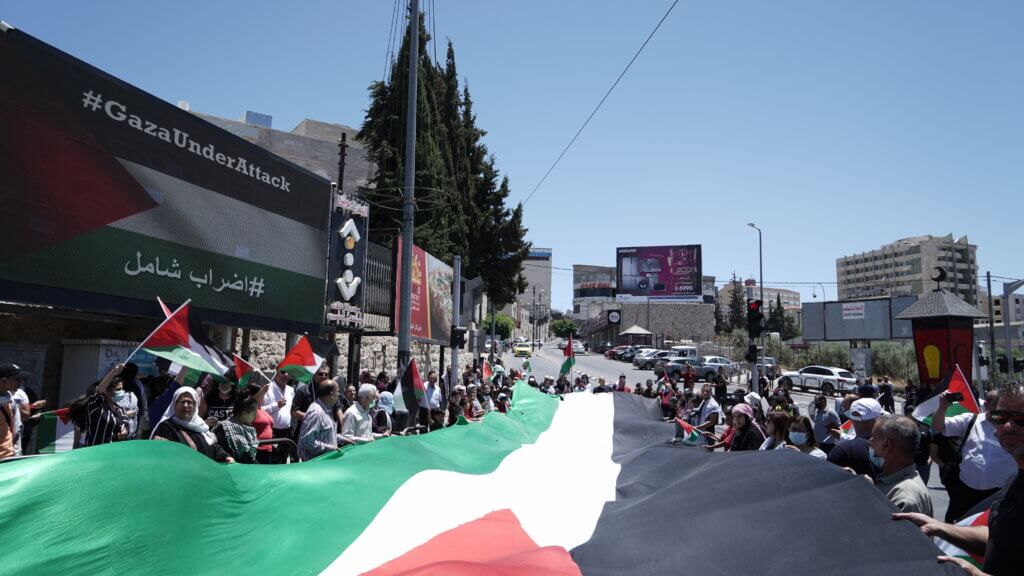
“Our message is that no matter how we have been divided by the Israeli occupation, we are one people,” Humam Abu Srour told Mondoweiss. “And not just inside Palestine, but in Jordan, Lebanon, Syria, America, Europe.”
“It has been amazing to see everyone going out to protest against oppression and against the occupation all around the world. It makes us proud that people are starting to look at us and our cause with a different lens. Now more people are seeing the reality that we are under occupation, and we deserve to have freedom,” he said.
As a young Palestinian, Odeh told Mondoweiss that the strike has meant the world to her because “even after 73 years, and all the division that Israel has tried to create within our community and the separation of the Palestinians over all these years, this strike shows that we are still strong.”
“Palestinians from the north to the south, from Nazareth, Haifa, Yaffa, and all the places in ‘48 are standing up with our people in Jerusalem, the West Bank and Gaza,” she said, adding “this unity means a lot to me. It makes me hopeful.”
“Even if we don’t liberate Palestine today, we are really making a change and doing something, and I see today as a huge victory for us,” she said.
For Odeh, Abu Srour, and so many Palestinians, the most important thing moving forward from this current moment is to keep the momentum going.
In their call for the strike, Palestinians urged people around the world to show solidarity with the strike by hosting different actions and demonstrations at Israeli embassies and consulates around the world, by hosting protests and vigil for the Palestinians killed by Israeli violence, by voicing support for Boycotts, Divestment, and Sanctions (BDS), and calling on their governments to place sanctions on Israel.
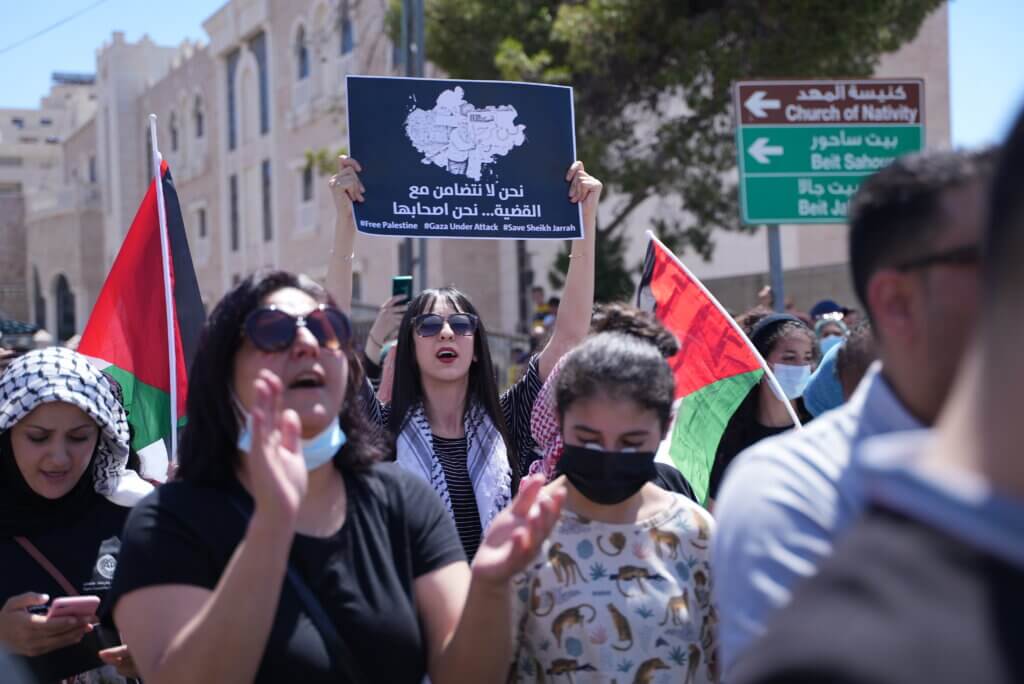
“Our message to the world is that those people who are seeing our struggle, they need to more pressure on their governments, and put more pressure on the Israelis to stop their crimes,” Abu Srour said.
“Boycott Israeli products, call for sanctions, all of this can force Israel to end the occupation and give us our rights,” he said.”
Echoing similar sentiments, Odeh urged people to “continue this movement, don’t stop.”
“It shouldn’t just stop today,” Odeh urged. “Our struggle is not limited to one day or one moment. We are talking about a struggle that is bigger and one that needs to continue.”
“Just because we striked today, doesn’t mean we should go back to normal tomorrow. We need to keep up this momentum, and I hope that the solidarity we are seeing with us right now continues into the future,” she said.
“Things are changing, we can see it, we can feel it.”
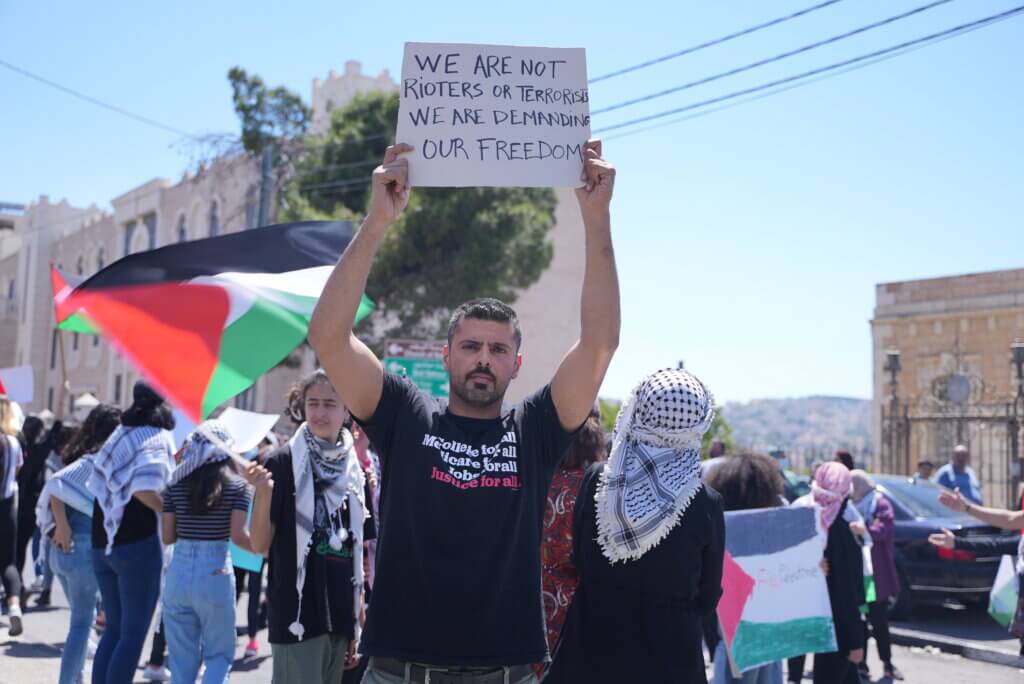
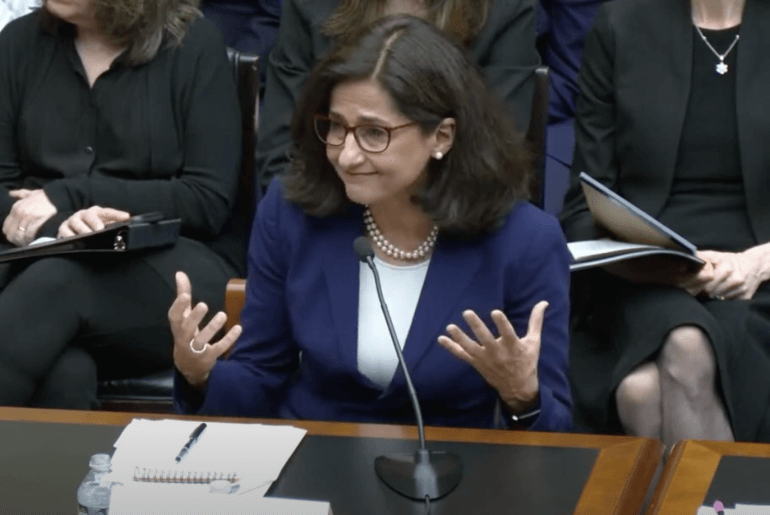
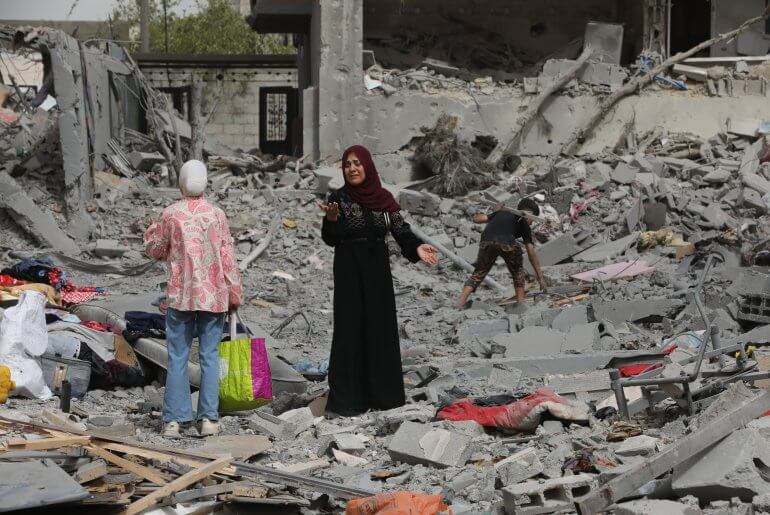
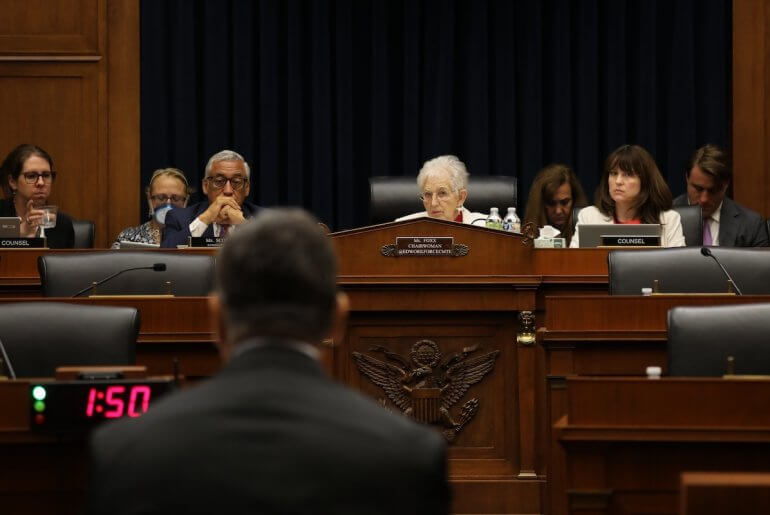
“Apparently, the Palestinians – almost alone among this planet’s peoples – are expected to show a monk-like stoicism in the face of nearly a century of suffering and suppression.”
from
https://original.antiwar.com/Danny_Sjursen/2021/05/17/refusing-erasure-palestinian-resistance-israels-hopeless-fury-and-a-coming-cataclysm/
And a story about some Jews being expelled from their historic homeland.
https://www.youtube.com/watch?v=jJHxG7YZoas
Israel and its mouthpieces here have been able to makes things murky, and blamed it all on the Palestinians, successfully painting all as terrorists/Hamas sympathizers, through the obedient zionist media, who were happy to carry the water for them. Thanks to social media, and Americans having access to international media, that support is gradually lessening. People are beginning to realize that the Palestinian people are all not Hamas, many do not support Hamas, and that the majority of Palestinians are unarmed, helpless civilians, all living in an open prison. 2 millions people living in a 25 mile long strip in Gaza. Right now people who care about human rights are shocked at the sight of babies being pulled out of the rubble. Every time Israel bombards Gaza, more people dislike it.
Well deserved.
Publicity generated over Sheikh Jarrah placed inequality under law, giving Jews land rights Palestinians didn’t have, on the big table. The storming/assault on the Al-Aqsa mosque during Ramadan prayers, put arrogant bullying on the table by offending fair minded people the world over. Hamas, concluding non-violence had proved to not work, issued an ultimatum, and initiated war.
The plausibility of two states has passed making co-existence in a secular state the solution thus making force inappropriate. George Zeidan, in the first photograph, carried a placard that effectively made Palestine’s case for freedom. America is now ready to support equality under law. Placards like his, in English, can bring its people to support freedom and equality for all people from the river to the sea. Together, these peoples can achieve much, perhaps be a light to the world.
A most comprehensive post, Yumna. Thanks so very much. Solidarity with Palestinians worldwide is the only way forward out of the Zionist massacres and toward justice. Oh, and calling legislators and so many others to DO the correct thing is ever so important. I want to thank all of the protesters and strikers. Things are changing, thank heavens. I also want to thank Ms. Odeh for giving voice to this particular pet peeve of mine:
‘“They keep calling us Israeli Arabs — we are not Israeli Arabs, we are Palestinians. And today, they have been reminded of that.”’